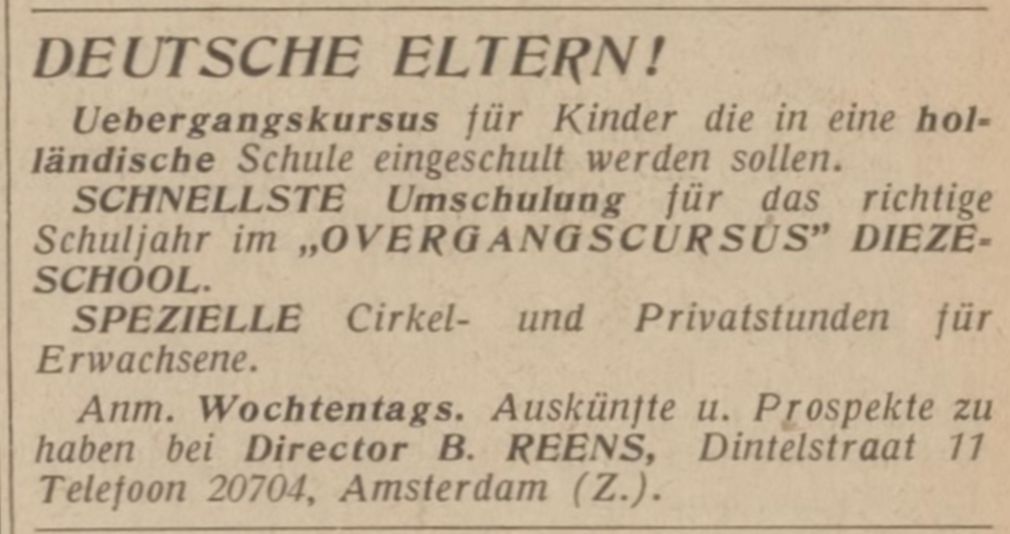The Transition Course
The Transition Course was intended to prepare children of German immigrants, mainly Jewish refugees, for Dutch education and Dutch society.

Advertentie voor de "Overgangscursus", Centraal blad voor Israëlieten in Nederland, 20 januari 1938
www.delpher.nl Copyright: Publiek domein
A Transitional Course (Overgangscursus) was set up for children of Jewish and non-Jewish emigrants in June 1933 at the Public School, Govert Flinckstraat 64.[1] To prepare them well for a Dutch school, they were taught Dutch, arithmetic and gymnastics. Over time, the course duration, the number of lessons and subject matter were adjusted. After November 1938, courses such as English, Spanish, French, Hebrew, geography and history were added.[2]
The preparatory school was paid for by a subsidy from the Committee for Special Jewish Interests and by school fees that parents paid themselves. Children of poor parents could attend for free. The school was under medical supervision by the school doctor's service and was visited by a school nurse.[3]
The school moved locations several times: in 1934 to the Vondelschool in Moreelsestraat[3] and then in 1935 to the Diezeschool at Dintelstraat 11 in Amsterdam's Rivierenbuurt.[4] At the end of 1938 or the beginning of 1939, the course was first moved to the Deurlooschool at Dintelstraat 7,[2] and then in August 1939 to the Valeriusschool in Des Prèsstraat.[5]
Even though Hello Silberberg already spoke Dutch, his grandfather sent him to the Transition Course at the Diezeschool to learn Dutch.[6] Peter van Pels probably took the Transition Course at the Diezeschool before going to secondary school, but it is not known when and for how long. His cousin Trude Leeser was also on it, as were probably his cousins Doris and Günter Goldschmidt.
Overgangscursus is the title of a collection of columns that writer Renate Rubinstein (1929-1990) wrote under her pseudonym Tamar in the weekly magazine Vrij Nederland. In it she writes:
'My mind drifted back to a long time ago, when I was still a child with a different language and culture who nevertheless had to go to primary school in the Netherlands. It was 1938, so before the war. My brother, sister and I had fled Germany by way of England. There suddenly were a lot of such children and the government had set up a Transition Course for them. The course lasted two months, after which you were placed in the class they deemed you suitable for: I was placed in the third grade, my brother and sister in the first grade, which was entirely in accordance with my ideas about our pecking order. (I was the eldest, they were a year and a half younger.) They still learned to how to read with a primer, I could already read. In German and English of course and now a third language to boot. Children find that a very usual thing.'[7]
The Transition Course was led by Benjamin Reens.[8] In September 1941, three weeks after the compulsory segregation of Jewish students in education introduced by the occupying forces, Reens still advertised his course.[9] He then organized the course at his home address at Eemsstraat 13.[10]
Footnotes
- ^ 'Onderwijs aan kinderen van Duitsche uitgewekenen', Centraal blad voor Israëlieten in Nederland, 17 januari 1935; 'Twee jaar onderwijs aan kinderen van Duitse uitgewekenen', Centraal blad voor Israëlieten in Nederland, 22 augustus 1935.
- a, b 'Zes jaren Onderwijs aan kinderen van Duitse uitgewekenen', Centraal blad voor Israëlieten in Nederland, 22 juni 1939.
- a, b 'Onderwijs aan Duitsche kinderen', Algemeen Handelsblad, 30 januari 1934.
- ^ 'Onderwijs aan Duitse kinderen', Het Volk, 21 augustus 1935. Deze verhuizing was ingegeven door bezuiniginen van het Amsterdamse college van B&W: 'Duitsche uitgewekenen', Nieuw Israelietisch Weekblad, 2 augustus 1935.
- ^ 'De overgangscursus', Nieuw Israelietisch Weekblad, 1 september 1939.
- ^ Anne Frank Stichting, Getuigenarchief Silberberg, Helmut, transcriptie interview Edmond Silberberg door Teresien da Silva, 1 september 2012, p. 9.
- ^ Renate Rubinstein, Overgangscursus, Amsterdam: Meulenhoff, 1990.
- ^ Joods Monument, Benjamin Reens.
- ^ Advertentie 'Overgangscursus', Het Joodsche Weekblad, 26 september 1941.